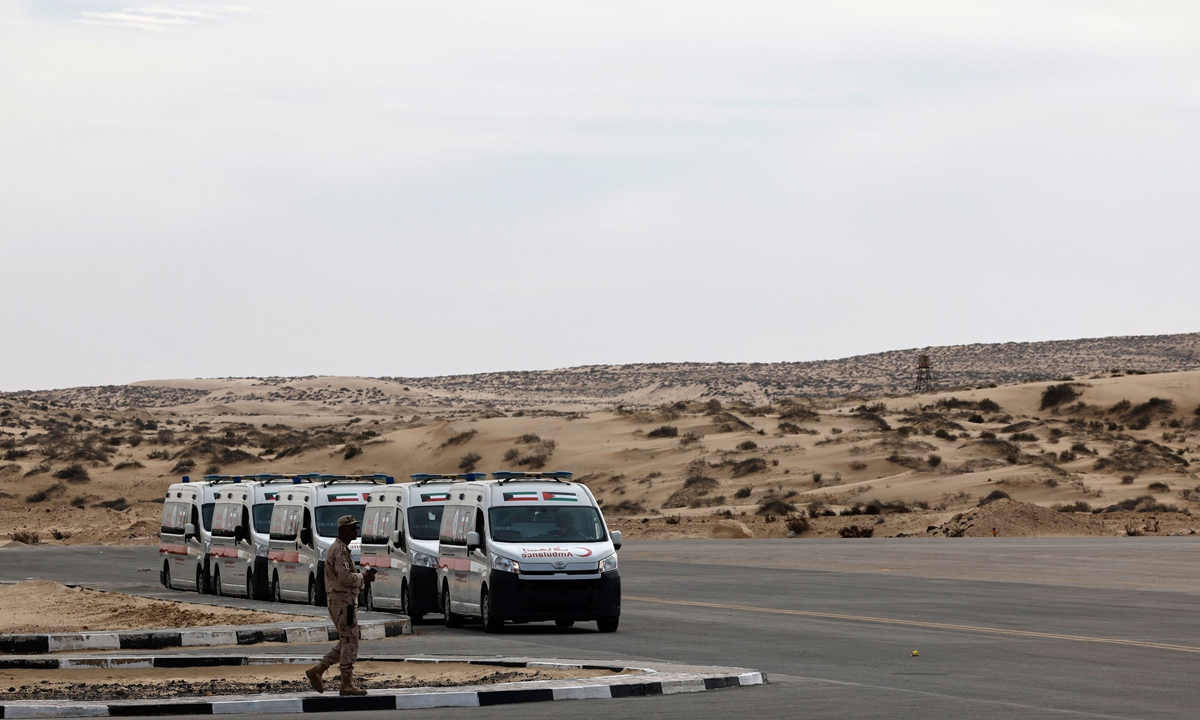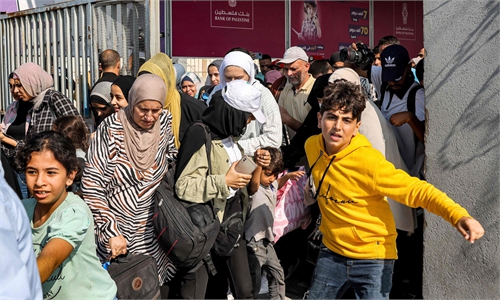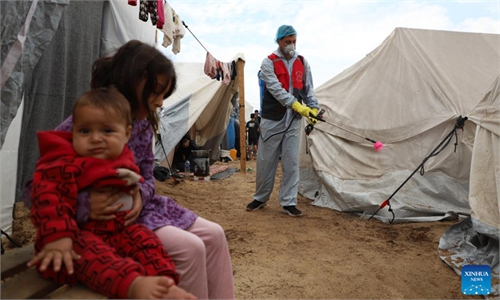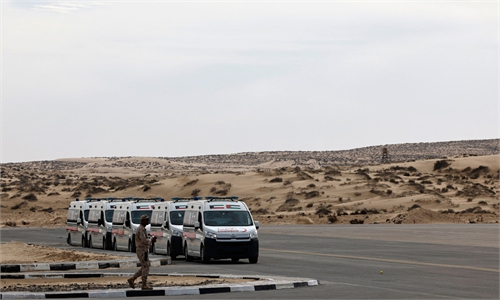China welcomes temporary cease-fire between Hamas and Israel, urging more efforts to cool tensions

A soldier patrols as humanitarian aid is unloaded at Egypt's al-Arish Airport on November 22, 2023, ahead of being transported to the Rafah border area with the Gaza Strip. Israel and Hamas announced a deal on November 22, allowing at least 50 hostages and scores of Palestinian prisoners to be freed while offering besieged Gaza residents a four-day truce after weeks of all-out war. Photo: VCG
The two sides in the Israel-Hamas conflict have agreed to a four-day cease-fire in the Gaza Strip and the release of at least 50 hostages held in Gaza. China welcomed the development on Wednesday, in the hope that the agreement will alleviate the humanitarian crisis and push forward the de-escalation of the situation.
Chinese observers said this positive sign could indicate a temporary cooling down of the situation, which was achieved due to multiple factors including mounting pressure that both Israel and Hamas have been facing, the latest UN Security Council resolution adopted under China's rotating presidency, the strong voice of the Global South through the latest BRICS extraordinary virtual summit, and the active mediation of the Arab world.
Israel and Hamas agreed to a Qatar-mediated deal for a four-day truce in Gaza and the release of 50 captives held in the enclave in exchange for 150 Palestinians imprisoned in Israel, according to media reports. Women and children will be released.
We welcome the temporary cease-fire agreement reached by the relevant parties, hoping it will help to alleviate the humanitarian crisis, and push for de-escalating the conflict, and easing tensions, Mao Ning, a spokesperson of the Chinese Foreign Ministry, told at a press conference on Wednesday.
Signs of 'de-escalation'
The truce came after leaders from the BRICS countries gathered in an unprecedented virtual meeting on Tuesday night, calling for a sustained truce in the Israel-Hamas war. Although the four-day cease-fire does not mean the end of the war, some observers considered it as a positive development achieved through the joint efforts of various parties.
Officials from Qatar, which has been mediating secret negotiations, as well as the US, Israel and Hamas have for days been saying a deal was imminent, Reuters reported.
Hamas is believed to be holding more than 200 hostages captive, who were taken when its fighters surged into Israel on October 7, killing 1,200 people, Reuters said, citing Israeli tallies.
A statement from Israeli Prime Minister Benjamin Netanyahu's office said 50 women and children will be released over four days, during which there will be a pause in fighting, according to media reports.
And for every additional 10 hostages released, the pause would be extended by another day, it said, without mentioning the release of Palestinian prisoners in exchange, according to the Reuters report.
"There are signs of de-escalation in the Israel-Palestine conflict, which is a positive indication," Sun Degang, director of the Center for Middle Eastern Studies at Fudan University, told the Global Times on Wednesday.
With China serving as the rotating president of the UN Security Council, the UN Security Council passed Resolution 2712 on November 15, calling for the immediate release of hostages. "Now we've seen concrete results achieved after the implementation of the resolution," Sun said.
During the BRICS extraordinary virtual summit on the Palestinian-Israeli issue on Tuesday evening, Chinese President Xi Jinping called for an immediate cease-fire and release of civilians held captive as urgent and imperative.
As the humanitarian crisis in Gaza continued to unfold, Israel has been facing mounting pressure both domestically and internationally to end its offensive in Gaza. However, Israeli Prime Minister Benjamin Netanyahu said Israel will continue its war against Hamas, even if a temporary cease-fire is reached with the Islamic militant group to release hostages, local media reported.
"We wouldn't say this four-day truce would be a major turning point in the Israel-Hamas conflict but it's more like a short-term buffer as both Hamas militants and Israel have been facing external pressure," Zhu Yongbiao, director of the Center for Afghanistan Studies at Lanzhou University, told the Global Times on Wednesday.
At present, a temporary cease-fire is undoubtedly conducive to easing the overall situation and may create favorable conditions for further peace talks in the future. However, it likely will not change the broader situation significantly, Zhu said.
'Window of opportunity'
Still, the four-day truce could serve as "a window of opportunity" for the global community to continue mediating to see if there's any chance to extend it, some experts said.
Xi said during the BRICS virtual summit on Tuesday that China calls for early convening of an international peace conference that is more authoritative to build international consensus for peace and work toward an early solution to the question of Palestine that is comprehensive, just and sustainable.
"There was a quartet mechanism involving the US, the EU, Russia and the UN, but it has become paralyzed and has not been operational for a considerable length of time," Liu Zhongmin, a professor at the Middle East Studies Institute of Shanghai International Studies University, told the Global Times on Wednesday.
Establishing a more authoritative international mechanism likely will still need to be centered around the UN, Liu said. "With signs of improvement in the China-US relations, it's more likely that major countries will play a more constructive role to push forward possible consensus at the level of the UN Security Council," he added.
After senior diplomats from Jordan, Saudi Arabia, Egypt, Palestine and Indonesia visited China from Monday to Tuesday, they will also visit the US, the UK and France, which was mandated by the Joint Arab Islamic Extraordinary Summit in Riyadh on November 11.
Although the truce was agreed through the mediation of countries like Qatar, it cannot be made with the participation of only one or two parties, some experts said, noting that the participation of the various forces led to the current situation including the efforts of other Arab and Islamic countries.
However, given the divided stances among countries in the Middle East such as Iran and Turkey, in addition to the conflicts inside Palestine, for example, between Hamas and the Palestine Liberation Organization, it is still difficult to ease the mistrust and hatred in the short term, casting a shadow over hopes for resolving the conflict in the long term, some experts said.
"Israel is facing its own domestic political struggle, which means both sides in the Palestine-Israel conflict need a period of adjustment," Liu said.




